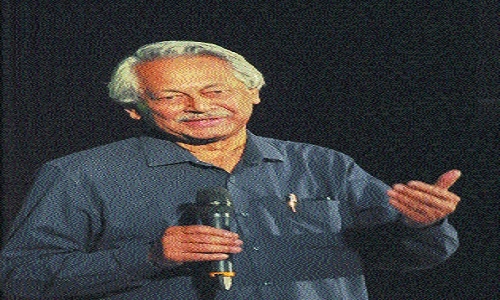Kasaravalli on the art of watching, film-making
| Date :02-Jun-2023 |

By Maitrayee Sangitrao
“Many critics write only about the surface details of the movie but Cinema is not just that. Cinema is a discourse. When we watch a film, we are internally making an argument about the sociopolitical situation, about the existence of man, and all sorts of philosophical questions. It is about going beyond the surface and into the soul of the story, ” said Padma Shri Girish Kasaravalli during an interview with The Hitavada. Fondly remembering his days at FTII, Kasaravalli said, “There is an art in watching films. When I was studying at FTII, we were all exposed to it.” Girish Kasaravalli, the recipient of 15 National Film Awards, mentioned his journey to Direction as a ‘happy accident’. “I was studying Pharmacy and was supposed to continue in that field. But life led me here,” he said smilingly.
Although, he had been exposed to cinema much later in life, Kasaravalli was always a Director in the making. Growing up in a remote area of Karnataka, he never had the opportunity to watch movies, except during summers. “The nearest theatre was 4 hours away and Kannada cinema never really impressed me. But we had a good library. This led me to read Kannada literature. It has since then been an integral part of my life,” said the film-maker.
Crediting his deep understanding and observation skills to his grandfather, he said, “My grandfather was a Sanskrit scholar. Whenever we would read with him, he would insist us to explain what we read. Later, he would point out the defects and the short comings of the story and expand upon what we should expect from a good novel.” Elaborating the characteristics of a great movie, Kasaravalli said, “I stress on politics, aesthetics, and philosophy employed in the film. But more than that I look for ‘what concerns the filmmaker’ and if that had been realised in the film.”
Talking about his own films which addresses socio-political issues, he said, “Our films don't get proper releases. I get great responses from small screens and it has nothing to do with the way people think. It is about the infrastructure.”
Appreciating today’s filmmakers on their sensibilities, sense for aesthetics and understanding he further added that cinema wasn’t like literature. “For cinema to be viable, there has to be a proper infrastructure in place. Today, there are many good filmmakers but their movies don’t get good releases.” Kasaravalli reflecting on his own process of becoming a Director said, “Direction, retrospection, creativity is a process. You cannot be self centered. You need to listen to people and have the capacity of viewing failure or success in larger context. All in all - it is about perspectives.”